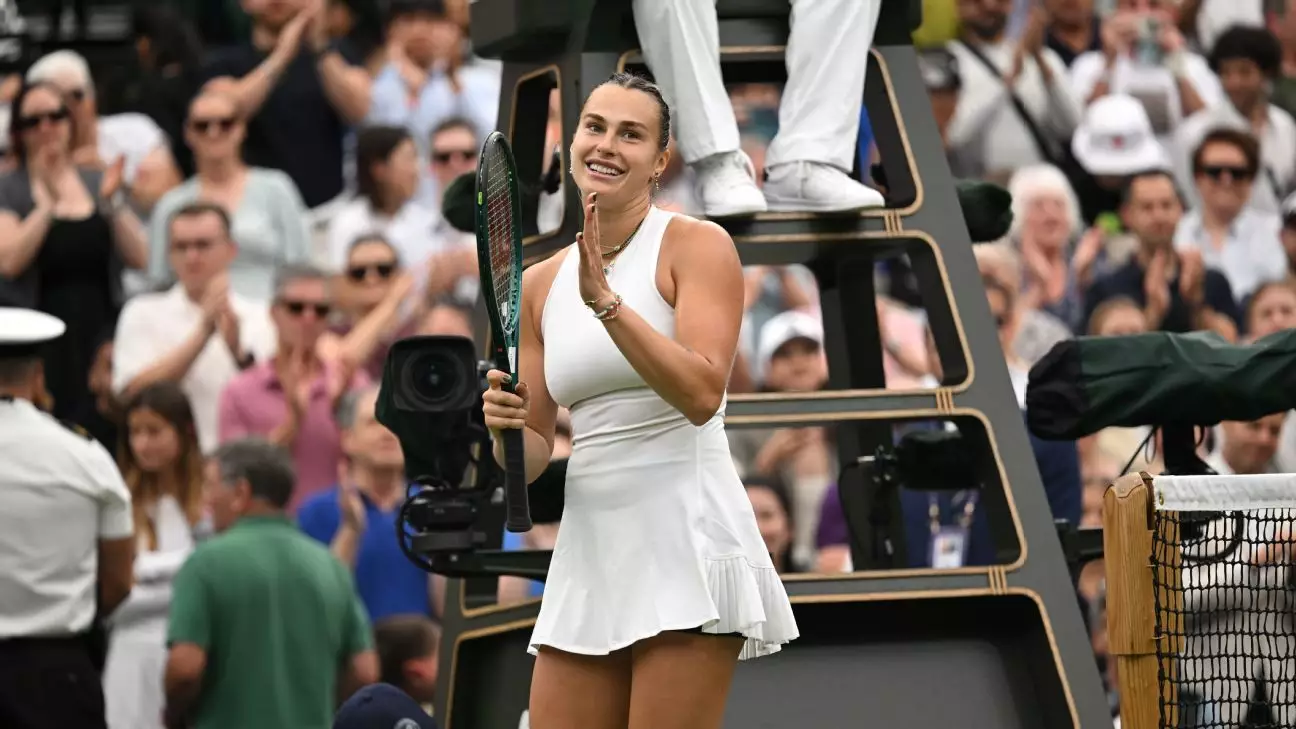Aryna Sabalenka’s recent victory at Wimbledon encapsulates her evolution into a dominant force on the tennis court. Her compelling 6-4, 7-6 (4) victory over Elise Mertens highlights not just skill but a mental toughness that overcomes challenges posed by familiar opponents. This win marks her 11th consecutive quarterfinal appearance in majors—an extraordinary feat that underscores her consistency and resilience. Her streak, only surpassed historically by Serena Williams’ 16 consecutive major quarterfinals, establishes Sabalenka as a pivotal player in the modern era of women’s tennis.
Sabalenka’s grasp on the match was evident from the outset, yet her performance was far from effortless. Despite an early lead and a commanding 4-1 advantage in the first set, Mertens refused to capitulate, forcing Sabalenka to fight for every game. Her ability to withstand Mertens’ rally and close out the set with a decisive backhand winner demonstrated her nerve and strategic prowess. The second set, culminating in a tense tiebreak, further highlighted Sabalenka’s mental fortitude. Her impressive 16-1 record in tiebreaks this season exemplifies her razor-sharp focus under pressure—an invaluable trait in high-stakes competitions.
While her impressive streak is a testament to her skill, it is her psychological tenacity that elevates Sabalenka from a talented contender to a genuine title hopeful. Her statements post-match reflect genuine pride and humility: she acknowledged the difficulty of facing a close friend and rival, recognizing the emotional complexity intertwined with her victory. Her resilience isn’t merely about athletic prowess but also about her capacity to manage personal relationships on the court while maintaining a relentless competitive edge.
Turning Challenges into Triumphs: The Significance of Her Unwavering Confidence
Sabalenka’s rise isn’t purely a result of talent but an embodiment of confidence cultivated through relentless effort and experience. Her undefeated streak in tiebreaks this year reveals a player who thrives under pressure, transforming stress into a weapon. This mental resilience is what distinguishes her from many peers—her ability to stay composed in critical moments often decides victory in favor of her.
Her journey to this point has faced obstacles—injuries, intense rivalries, and the pressure to translate raw power into consistency. Yet, each challenge seems to reinforce her resolve. Rather than shying away or losing composure, Sabalenka leans into adversity, drawing strength from her capacity to adapt and overcome. Her focus on continuous improvement is evident; her statement about being “super happy” with her performance reflects not only satisfaction but also a hunger for more.
Moreover, her connection with the Wimbledon crowd adds an intriguing layer to her narrative. As she openly expressed gratitude and acknowledged their support, Sabalenka’s rapport with fans seems to grow stronger. Her emotional intelligence and relatability counterbalance her aggressive playing style, making her a compelling figure capable of inspiring both admiration and respect. Her confidence isn’t just about her game but also about her belief in her right to succeed amid a competitive field that often favors more traditional, steady players.
Emerging Challenge: Facing Veteran Siegemund and What It Reveals About Her Future
Sabalenka’s upcoming match against Laura Siegemund signals a new chapter in her Wimbledon campaign. Siegemund, at 37, embodies resilience and longevity—traits that will undoubtedly test Sabalenka’s focus and endurance. Despite the veteran’s unorthodox, risk-free approach, Sabalenka’s aggressive style remains her strength; her ability to adapt and counter Siegemund’s tactics will be crucial.
Siegemund’s journey to the quarters demonstrates her strategic mindset and experience, which can serve as a blueprint for Sabalenka. As she faces an opponent who is unafraid to gamble on grass courts, Sabalenka must maintain her composure and extend her mental toughness. Her recent warmup matches, shifting from her usual clay-court routine, underscore her adaptability and willingness to explore new strategies—traits that will serve her well against a seasoned opponent.
What this matchup symbolizes is more than just a clash of styles; it’s a test of Sabalenka’s ability to maintain her mental edge amidst external challenges. Her capacity to stay loose yet focused, aggressive yet disciplined, will play a decisive role. Her journey represents not just a quest for her first Wimbledon crown but also a testament to unwavering self-belief amid an evolving landscape of women’s tennis.
Ultimately, Sabalenka’s story is one of persistent resilience. Each match, each victory, is a testament to her relentless pursuit of excellence. Her rise at Wimbledon symbolizes an inspiring declaration: that confidence, when combined with unbreakable resilience, can propel even the most aggressive player toward the pinnacle of tennis greatness.


Leave a Reply